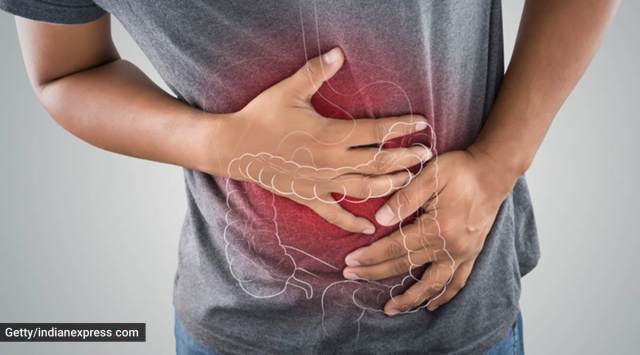- India
- International
Intestinal gangrene and Covid: Here’s what you need to know
According to a doctor, it occurs when blood flow to the small intestine is blocked due to pressure from outside on the blood supplying artery/blockage of the artery
 It is important to pay attention to IBS (Source: Getty Images/Thinkstock)
It is important to pay attention to IBS (Source: Getty Images/Thinkstock)In the second wave, the several virus mutations have caused a tremendous burden on human health. Apart from respiratory symptoms, the infection has presented itself in the form of gastrointestinal symptoms — diarrhea, nausea/vomiting — anorexia, abdominal pain, abnormal liver enzymes.
Dr Hemant A Patil, advanced laparoscopic and gastrointestinal surgeon at Fortis Hospital Mulund, explains that Covid increases the chances of coagulopathy — a condition in which the blood’s ability to form clots is impaired — especially in patients with severe disease.
“We are seeing a marginal rise in cases of intestinal gangrene caused by mesenteric thrombosis in patients with Covid. Researchers have found evidence that the gastrointestinal tract is an important portal of entry, and a possible site of the persistent source of infection via prolonged fecal shedding with concurrent gastrointestinal symptoms,” he says.
What is intestinal gangrene?
According to the doctor, it “involves short or long segments of your small intestines”.
“It occurs when blood flow to the small intestine is blocked due to pressure from outside on the blood supplying artery/blockage of the artery. Two causes of intestine gangrene are external pressure in cases of strangulated hernia, and blockage of mesenteric arteries, which are internal blockages; this is what we are seeing in Covid patients.”

If left untreated, intestinal gangrene can be fatal, warns the doctor.
What are its causes?
There are a number of risk factors that increase the chances of developing this condition:
* Injury of the vessel/arteries in the intestine
* Strangulation of intestine/bowel in the hernia
* Blockage of an artery leading the intestine
* Long-standing uncontrolled diabetes mellitus
* Chronic smoking
* Old age
* Dyslipidemia (having blood lipid levels that are too high)
* Obesity
The symptoms
The symptoms of intestinal gangrene typically include abdominal pain (mild to severe), bloating, vomiting, diarrhea, blood in stools/dark coloured stools, fever.
Other symptoms include abdominal distension, perforation, sepsis.
Covid-19 and intestinal gangrene
The doctor explains that while it is known that Covid infection lowers immunity and the patient’s ability to fight disease, people with uncontrolled diabetes, obesity and extremely lowered immunity are at higher risk.
“Hypercoagulopathy (when blood forms a clot when it shouldn’t ) increases the chances of pulmonary embolism, deep vein thrombosis (DVT) and also mesenteric artery thrombosis.”
Diagnosis
Early detection is crucial. Covid patients whose symptoms are highly suspicious need to be investigated for intestinal gangrene — a CT scan of the abdomen with angiography to identify blockages.
Treatment
“Blood thinners are the main treatment for this condition in early stages. If you have a blood clotting disorder, you may need to take blood thinners indefinitely. In some cases — such as when a blood clot is discovered in the mesenteric veins/artery — blood thinners can be delivered directly to the clot through a procedure called thrombolysis,” says Dr Patil.
Other treatment modules:
* Low-Molecular-Weight Heparin (LMWH)
* Intravascular thrombolysis
* In some cases, where intestinal gangrene has already established, surgical intervention
Prevention
Covid vaccines are supposed to trigger an immune response to fight against the virus and help reduce complications. The doctor insists you follow these guidelines to ensure you don’t get intestinal gangrene:
1. Eat healthy, eat right
2. Weight reduction (speak to your physician about this)
3. Keep diabetes under control
4. Stop tobacco consumption
5. Exercise regularly
6. Don’t ignore symptoms
7. Wear a mask when around infected people or while venturing out
8. Maintain social distancing
9. Use sanitiser
10. Seek early help for any abdominal symptoms
For more lifestyle news, follow us: Twitter: lifestyle_ie | Facebook: IE Lifestyle | Instagram: ie_lifestyle
More Lifestyle
Apr 26: Latest News
- 01
- 02
- 03
- 04
- 05



























